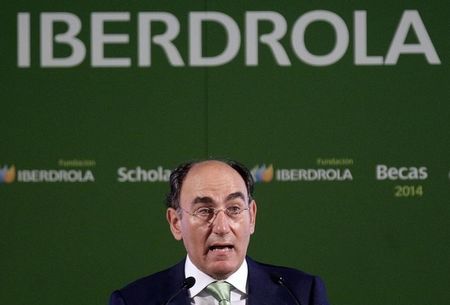By Andrés González and Arno Schuetze
MADRID/FRANKFURT (Reuters) - Spanish power firm Iberdrola (MC:IBE) has hired JPMorgan Chase & Co (N:JPM) to sell some foreign renewable assets which could raise up to 2 billion euros (1.57 billion pounds) to help fund an acquisition in the fast-growing U.S. market, three sources with knowledge of the matter said.
Iberdrola, a world leader in wind turbines, joins other European companies, including Germany's Siemens (DE:SIEGn) which has agreed to buy U.S. turbine maker Dresser-Rand (N:DRC), hoping to grow through purchases outside sluggish home markets.
Iberdrola's earnings suffered in Europe's economic crisis and from energy reforms in Spain, where new power generation taxes and renewable cuts dented profits.
It has already mandated Morgan Stanley to explore the sale of a minority stake in its Spanish distribution business as part of its boldest move to boost earnings since 2011, a strategy aimed at cutting exposure to Spain and investing abroad.
"Iberdrola is looking for a purchase in the United States. They're not going to sell anything unless they have an adequate acquisition target," said one financial source who asked to remain anonymous.
Iberdrola, which has been mentioned as a possible suitor of both Louisiana's electricity supplier Cleco Corp's (N:CNL) and Oncor, the power distribution unit of Texas's biggest power company, declined to comment.
The JPMorgan mandate is for a sale of minority stakes in several renewable energy assets such as mature wind farms or solar plants that could be worth about 2 billion euros, two sources with knowledge of the matter said. JPMorgan declined to comment.
Iberdrola has assets capable of producing 14,400 megawatts (MW)of renewable energy across the world, with 5,700 MW in Spain and 5,457 MW in the United States.
The sale of the Spanish distribution business that Morgan Stanley is exploring could raise about 3 billion euros, said UBS analyst Alberto Gandolfi in a note to clients. Two sources with direct knowledge of this process confirmed this valuation.
"They are 'on & off' mandates that Iberdrola activates or deactivates according to its needs," another source said.
The two sales could free up funds for a major U.S. acquisition, a sign that confidence has returned at the company after it was forced to put an international expansion drive on hold in 2011 during the euro zone debt crisis which made it harder for Spanish companies to borrow.
Iberdrola would like to add more electricity distribution assets to its U.S. portfolio, two of the sources said. Such assets are attractive because they offer a recurring income and their performance is less dependent on energy prices moves.
Spain's energy reforms which aimed to cut a massive tariff shortfall in the regulated power system have added to the company's pain, wiping 1.4 billion euros from Iberdrola's earnings since 2011. It has 26 billion euros in debts.
Funding an acquisition through sales would allow the company, based in northern Bilbao, to avoid borrowing more money and diluting its share capital by bringing in new shareholders.
U.S. PREDATOR
Iberdrola has ruled out bidding for Cleco and the size of Oncor, valued at $20 billion including debt, could be hard to digest. One option could be to buy some of Oncor's assets.
"If (an acquisition) were done, it'd be a small deal... $20 billion is an outrageous sum," said one source close to Iberdrola, with a market value of about 35 billion euros.
"Yet (Oncor) appears the type of business that would fit Iberdrola's asset rotation strategy: fully regulated, in a country with a visible framework, and which could feature good organic growth," UBS said in a note to clients.
During 2010-13, Oncor delivered core earnings growth of 21.5 percent while Iberdrola's Ebitda EPS fell 5 percent, largely due to the impact of Spanish regulatory measures.
Angry over the painful reforms, Iberdrola Chairman Ignacio Sanchez Galan has vowed to slash domestic investments and boost exposure abroad. The company already owns Scottish Power and U.S. Energy East, bought in 2006 and 2007, before Spain's financial crisis.

Still, a large chunk of its earnings before interest, taxes, depreciation and amortisation (EBITDA) continue to come from Spain, including 71 percent from its generation business, 46 percent from its renewable arm and 42 percent from power grids.
(Additional reporting by Sophie Sassard and Freya Berry in London; Writing by Tracy Rucinski; Editing by Julien Toyer and Anna Willard)
2_800x533_L_1412520354.jpg)